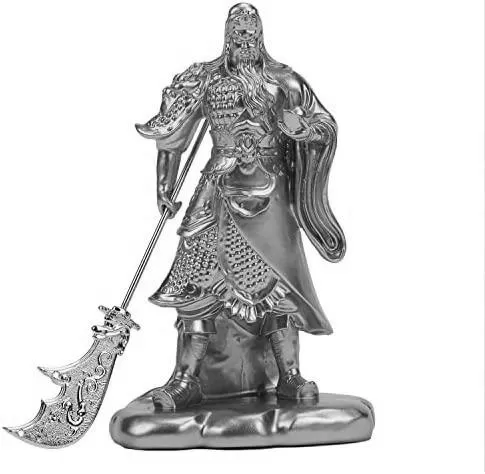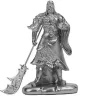Chinese martial deities are often depicted in statues, and you can find a number of great examples in your own home. Among the most popular are Guan Gong, Xuan Wu, and Bei Di. Let’s take a look at each one.
Guan Gong
The Guan Gong statue is a popular office decor item. The statue is a red-faced martial deity holding a sword. This statue has several different meanings, including protection from evil spirits, protection from unintentional profit loss, and fending off bad luck.
A Guan Gong statue can also protect your business from robbery. Many people believe that the statue can help them win a battle or overcome adversity. Consequently, many martial artists, business people, and even the police use these statues. You can also make a shrine in your home to honor Guan Gong.
In late 16th century Korea, the Koreans prayed to Guan Gong and repelled the Japanese invasion led by Toyotomi Hideyoshi. This is proof of the divine power of Guan Gong. Today, Chinese businessmen also pray to Guan Gong for sales breakthroughs.
In this statue, Guan Gong wears a gold and red robe and holds a massive weapon. He is flanked by his loyal bodyguard and general, Zhou Cang. After the death of Guan Gong, Zhou Cang committed suicide.
The deification of Guan Yu dates back to the Sui dynasty (AD581-618). His achievements were revered, and he was given the longest posthumous title of god, which contains 24 Chinese characters. He was also celebrated as the great holy deity of war, the protector of culture, and the promoter of morality. Guan Yu was worshipped in all sorts of industries, from warring to agriculture.
In addition to his popularity as a war general, Guan Gong was revered by Chinese emperors and generals as a deity. During the Three Kingdoms period, Guan Gong was considered a guardian deity and was often worshipped by generals and emperors to ensure victory in battle. Many of the emperors credited Guan Gong with many miracles. The famous Emperor Yong Le was a follower of Guan Gong.
Zhen Wu
The Chinese martial deity Zhen Wu has many attributes and is considered a mystical god in Chinese martial arts. He is also known as the God of Martial Arts. He is associated with the martial mountain Wu Tang Shan. In his statue, Zhen Wu is shown with armour on his back and holds a secret sword in his left hand. Many people do not understand the significance of this symbol. But it is important to note that many of the Chinese straight sword forms require this hand sign.
Zhenwu is one of the most revered figures in China and is revered for his protective and healing qualities. The statue of Zhenwu traditionally has a snake beneath his right foot and a tortoise on his left foot. The figure also has a jade belt in his left hand and bare feet on his right.
In Chinese martial arts, Zhenwu is also known as the god of the north, or Chen-wu. He is the patron of the provinces of Hebei and Manchuria. He is an important figure in the Taoist world. During the Ming and Qing dynasties, Zhenwu was worshipped by many people and appeared on countless temples.
Besides being a patron of martial arts, Zhen Wu is also known as Xuan Wu. Before being deified, he was a butcher. However, his self-cultivation made him an excellent patron of the arts. His powers to prevent floods are usually invoked.
As a direct disciple of Tiantai, he was the highest-ranked cultivator in the Zun Qi Layer. His abilities made him a great contender for the Hunt for the Fate Seeds. As a result, he became the ruler of Xue Yue.
Xuan Wu
Xuan Wu is a Chinese martial deity and the god of martial arts. He is referred to by many different names, such as the “Dark Lord”, “John Chen”, “Xuan Tian Shang Di”, “Northern Wind,” and “leader of the Winds.” This deity was a warrior who lived during the time of the Yellow Emperor. He is the creator of the art of martial arts.
Xuan Wu is depicted as an imperial warrior, wearing imperial robes. His left hand is placed in the “three mountain hand seal”, and his right hand holds a sword that once belonged to Lu Dongbin, one of the Eight Immortals. The sword had been lent to Xuan Wu by Lu Dongbin, but he had refused to return it because of its power. He is seen holding the sword tightly, as if he is unable to let go.
Xuan Wu is one of the most popular Taoist deities in China. He is the patron of many martial arts styles and is one of the most revered deities in the country. He is also widely revered in Guangdong, Fujian, Manchuria, Mongolia, and Hebei. He is also a well-loved figure in the Chinese diaspora.
Xuan Wu is also known as “Chao Pho Suea” in Thailand and as “Da Lao Ye” in the Teochew dialect. While there are many shrines dedicated to him, the most famous one is located in Bangkok’s Sam Phraeng district, near the Giant Swing. The temple is highly revered by Thais and Chinese, especially during the Chinese New Year.
Xuan Wu was an important figure during the time of the Si Kong Clan. He was a major god and had the power to transform a human into a dragon. He also protected people from evil spirits. However, he was once attacked by outsiders. As a result, he teamed up with his brother, Lin Feng, to fight them. This time, he fought back, using the imperial weapon he had recently been gifted.
Bei Di
Bei Di, also known as Xuanwu, is a Chinese martial deity, one of the Three Sovereigns, and patron of the arts. He is also considered the ancestor of the Chinese race. He is credited with many inventions, including the compass chariot, supposedly used to defeat the evil Chi You. In addition, he is credited with many ancient texts, including the Huang Di Nei Jing, an ancient Chinese medical thesis.
The main hall of the Ningjing temple is dedicated to worship of Guan Di, and is flanked by statues of Guan Di’s body guard and son. The entrance to the main hall has a high threshold, and women were once barred from entering. Beams in the hall are decorated with lotus decorations and animal carvings.
Bei Di is often represented as a male with a puffed-up chest and a long beard. He also carries a guan dao, a Chinese polearm. During the twelfth century, he was worshipped by many people and he is still a popular deity today.
The Three Stars are the three traditional virtues, which are associated with a good life. Many people have statues of these three deities in their homes or workplaces. They represent longevity, prosperity, and a good life. The Three Stars are also associated with the passing of imperial exams.
Guan Yu
The Chinese martial deity Guan Yu is a very popular figure. He was famous for his thick beard and his ready-for-combat posture. He wore a cape-like garment and held a sword that was elaborately carved. The sword, which is called the “Green Dragon Crescent Blade,” was said to weigh 136 tons.
Guan Yu was worshiped and celebrated throughout the southern part of China. He was also a popular figure in Confucianism, Taoism, and Buddhism. His statues and shrines are found in many Chinese buildings. While this figure is well-known for being a powerful martial deity, he also had a sinful side.







